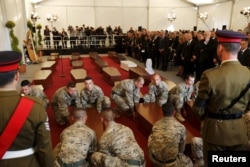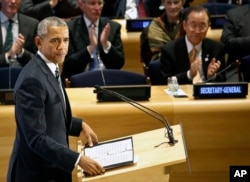With the abrupt collapse of a cease-fire in Syria last week, international migration officials expect no letup in a wave of migration out of the Middle East that has set off the worst global migrant crisis in 70 years.
The five-year conflict in Syria has displaced half its population, driving more than 6 million Syrians out of the country. Though more than 1 million Syrians have escaped to Europe, the majority live in camps in neighboring Turkey, Lebanon and Jordan.
The September 12 cease-fire, brokered by the U.S. and Russia, had raised expectations that the break in fighting could pave the way for peace, eventually allowing millions of Syrians living in temporary shelters in the region to return home instead of seeking asylum in Europe.
But as the truce crumbled in the wake of a U.S. airstrike on Syrian troops and Syrian government bombings of a U.N. aid convoy, hopes that a recent drop in migration to Europe could be extended were all but quashed.
"I'd turn the question around by saying, 'Have the drivers, have the root causes of forced movement — have they changed?' " said William Lacy Swing, director general of the Geneva-based International Organization for Migration (IOM). "And the answer is, clearly, given the state right now of the Syrian cease-fire, clearly the root causes have not changed."
Numbers down, deaths up
Data released by the IOM on Tuesday showed that the number of refugees and migrants arriving in Europe via the Mediterranean has plunged this year.
From January 1 through September 25, 302,149 migrants and refugees entered Europe by sea, down 40 percent from the 508,347 who crossed the Mediterranean during the same period last year, the IOM said.
Though migrant arrival numbers fell for the year, refugee deaths rose, with the IOM recording 3,501 refugee and migrant fatalities through September 25, up nearly 20 percent from the same period last year.
Last week, a boat overloaded with at least 600 migrants headed for Europe capsized off the coast of Egypt, killing at least 170 people, including women and children.
"This is a tragedy," Swing said in an interview with VOA. "People are dying needlessly because our policies end up indirectly and inadvertently subsidizing the smugglers." The migrants are pushed into smugglers' hands, he said, "because there are not enough avenues for people to get to their destinations."
More than 1 million migrants fled to Europe last year, with Syrian refugees accounting for 28 percent of the figure, followed by refugees from Afghanistan and Iraq, according to U.N. data.
With no end in sight to the conflicts in Syria and elsewhere in the Middle East and South Asia, Swing said the flow of refugees to Europe was likely to continue over the coming year.
The top priority, he said, "is to get the biggest problem solved, which is Syria."
Resettlement
Of a record 21.3 million refugees in the world today, the majority live in countries that neighbor their native lands. Less than 1 percent, however, are resettled in so-called third countries, mostly Western nations, through the U.N. refugee agency.
Under pressure to tackle the migrant crisis, more than 50 countries and organizations met in New York last week and pledged to double the number of refugees they take in through the U.N. program to 360,000 next year, with the U.S. raising its annual cap to 110,000 refugees in 2017.
But even with the additional pledges, the new resettlement target falls well short of the 1.2 million refugees the U.N. says will be in need of resettlement in 2017.
Swing said he was confident the nations attending last week's Leaders Summit on Refugees would honor their pledges of admitting more refugees, but with conflict driving ever greater numbers of people into exile, he added, "I do think it is pretty bad ... that we cannot reach a quota of 1 million."
President Barack Obama told the summit that the migrant crisis was "a test of our international system where all nations ought to share in our collective responsibilities, because the vast majority of refugees are hosted by just 10 countries."
To encourage other nations to take in refugees, the administration last week announced a new funding mechanism through which wealthy nations give money to less developed nations. The U.S. has contributed $11 million to the fund, which will be managed by the IOM and the U.N. refugee agency.
Swing said the fund could "play a major role" in expanding the global refugee resettlement program.
Meanwhile, the administration's plan to increase the number of refugee admissions from 86,000 this year to 110,000 refugees next year has touched off vocal opposition from Republicans and other immigration critics worried that bringing in more refugees could expose the country to terrorism.
Swing said those fears are unfounded.
"I think that if you look at the hundreds of thousands of cases that have come in here, up to now they have found virtually none," he said. "More likely is what happened in Europe: If they get here and they're not properly integrated, then they can become a problem."












